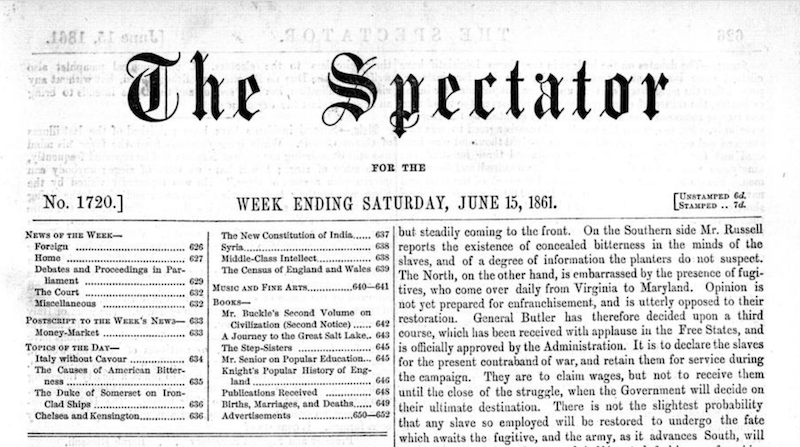In her article about the point of protest, Tali Fraser mentions the support of Manchester in the 1860s for the North against the slave-owning South in the US civil war. At the time, this was an unpopular cause amongst the British elite. Of all the publications still around today, only one backed Abraham Lincoln then: The Spectator. The magazine almost went bust as a result. I remarked a few days ago that what sets us apart from other long-running magazines is that our values have not changed much since we were founded in 1828 – or, indeed, since the The Spectator appeared in its original form in 1711. That aroused some teasing: surely, some asked, a magazine needs to change with the times? But the values I refer to – cherishing diversity of opinion, being unafraid to go against the grain – don’t age. I’ve written before about the ways in which the values of the 1711 Spectator inspire us today (including the name of this blog: Coffee House). But our position on the US civil war is a good example of how The Spectator is unafraid to find itself in a minority of one.
When Abraham Lincoln was elected in November 1860, he was dismissed by the British press as a country bumpkin with naïve and dangerous ideals. At the time, much of the UK economy relied on cheap cotton made in America’s slave-owning states. The grown-up way of seeing things, it was argued, was to leave things as they were and enjoy the fruits of the plantations. But how to reconcile this with the fate of so many still-enslaved black Americans?
When news of the civil war reached Britain and Queen Victoria declared neutrality, the co-editor of The Spectator, Meredith Townsend, wrote that Britain is ‘being taunted with servility to cotton, with false pretences of liberality’ when the cause at the heart of the issue was a moral one. In today’s parlance, whether black lives matter.
The quarrel – cover it with cotton as we may – is between freedom and slavery, right and wrong, the dominion of God and the dominion of the Devil. The duty of England, we submit, is clear.
Today, this reads as common sense – but at the time, it was incendiary. The Guardian backed the South. An editorial in the Times remarked that Lincoln and his fellow abolitionists…
preach with the Bible in their hands but in that book there is not one single text that can be perverted to prove Slavery unlawful, though there is much which naturally tends to its mitigation….If it be said that Slavery is at variance with the Spirit of the Gospel, so also are a good many things: purple and fine linen, wealth, ecclesiastical titles, unmarried clergy.
This spoke for the rest of the British press: yes, slavery in principle is bad. But let’s be adults! The world is complicated. Abolish slavey, as Lincoln et al. want to do, and chaos will ensue. Innocent women and children will be slaughtered by rampaging blacks. And wasn’t it better for the black slave to stay put, and enjoy the protection of dutiful slave owners?
The Spectator’s editorial urged Lincoln to make clear that the war had a moral objective: if the battle was explicitly against slavery, how can Britain stay neutral?
The proclamation of neutrality is regarded as a quasi-recognition of the South, and, though admitted to be legal, is denounced as an official surrender of the principles of freedom… Let the North once distinctly proclaim that issue, declare that the object of the war is the extinction of slavery, that no peace is possible which shall leave slavery in existence, and in the unanimous response of Englishmen even the dread of a cotton famine will be removed.
As Lincoln knew, if Britain intervened it would have sided with General Lee’s Confederacy (and had it done so, Lee would have won). The language used to attack Lincoln in the British press was worse than that used against Trump now. The Times said he was ‘the worst failure that America has ever produced’ giving speeches ‘riddled with confused grammar and blundering metaphors’. The Spectator conceded it was losing the argument and lamented that ‘the educated million’ in Britain have ‘become unmistakably Southern’ in their attitudes. As ever, we published opinion from both sides, including regular correspondence sent in from an unnamed ‘Yankee’ behind the lines. But his dim view of race relations directly clashed with those of The Spectator, a point we made on our front page in 1865:
We can endorse neither his facts nor arguments. He says the “loathing” between the two races is so deep-seated that amalgamation is impossible. We say that one-third of the slaves are, as appears from their colour, the result of that amalgamation. He says the presence of negroes in Congress is impossible. We say that it is found easy in Jamaica.
As The Spectator went ever more strongly against the tide, sales fell below 1,000 for the first time since its 1828 launch. Charles Darwin complained that the magazine had gone to the dogs: ‘we have no paper like the old Spectator in Rintoul’s time,’ he moaned. A daft thing to say: R.S. Rintoul set up The Spectator to fight for popular freedom, and battled hard for the 1832 Reform Act (whose birthday, incidentally, was yesterday). In arguing for popular freedom in America, The Spectator was being true to its principles, even if they ran very much against the mood of the time. Subscribers steadily fell away, as readers turned to other publications that put British financial interests ahead of the fate of black Americans overseas. In his brilliant new history of The Spectator, David Butterfield discloses that the magazine almost went bust as a result: ‘As contemporary rumour had it, the sole champions of the North in Britain were Queen Victoria, the Duke of Argyll and The Spectator.’ In fact, he notes, a similar position was soon taken by the Daily News and Macmillan’s Magazine. More significantly, there was keen support behind the scenes: John Stuart Mill, an occasional contributor, wrote to the editors to express ‘the very high estimation, both moral and intellectual, in which he holds The Spectator, under its present management.’
Our correspondent abroad, Edward Dicey, sent regular dispatches from the front line: amongst all European correspondents he stood out for his sympathies with the emancipation of black Americans. I have a book of his collected dispatches at home which sold almost no copies because his views went so against the grain, especially in his admiration of Lincoln.
After Lincoln’s assassination, Times revised its opinion. The Guardian was still implacably hostile, saying, “of his rule we can never speak except as a series of acts abhorrent to every true tuition of constitutional right and human liberty”. Like much of the UK press, the Guardian was nervous about the notion of universal franchise stirring in America (it said many doubt that “the working classes are sufficiently instructed to be fit to exercise a supreme control ever the interests of their own body, to say nothing of those of the nation”.) As has been observed, the Manchester Guardian (as then was) saw few gleams of good in anything American. In seeing an inspirational struggle, and a hero in Lincoln, The Spectator was pretty isolated amongst the British press.
Thomas Hughes, author or Tom Brown’s School Days, reminded the American press of this at the end of the decade: ‘The Spectator fought for you at the risk of absolute ruin; for its circulation is chiefly among the very class which was the most unfriendly and whose prejudices were faithfully represented by the Saturday Review and the Times.’ Even the proprietors felt justified in advertising the stand they took. Advertisements declared that The Spectator’s journalists ‘in the matter of the American War, fought against the mass of the very class they are trying to represent, and were finally acknowledged by them to have been in the right’, and sought to use this as a platform to rebuild when British opinions changed (as they certainly had by the time of Lincoln’s assassination). The Spectator sold itself, then, on the fact that it had fought almost to the death for its principles. Namely: to celebrate and protect…
the right of free thought, free speech, and free action, within the limits of law, under every form of Government… and in social questions, to urge the faith that God made the world for the people in it, and not for any race, class, colour, creed, or section, with all the consequences to which that principle leads.
So yes, many publications do go on a journey – ours has been pretty steadfast. That’s why, as I say here, no editor of this magazine really needs to worry about what it should stand for. The Spectator has always known its own mind.
I am indebted to David Butterfield for his help. His new book on The Spectator’s history is out now. For a five-week free trial subscription to The Spectator, click here
Got something to add? Join the discussion and comment below.
Get 10 issues for just $10
Subscribe to The Spectator Australia today for the next 10 magazine issues, plus full online access, for just $10.




















Comments
Don't miss out
Join the conversation with other Spectator Australia readers. Subscribe to leave a comment.
SUBSCRIBEAlready a subscriber? Log in